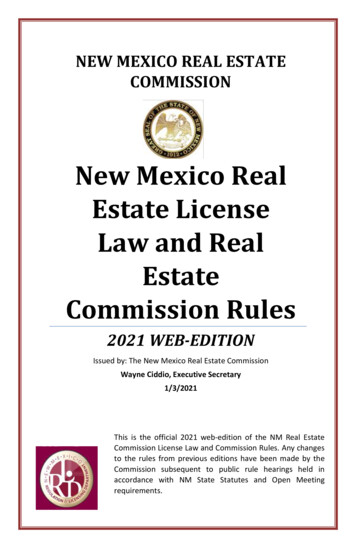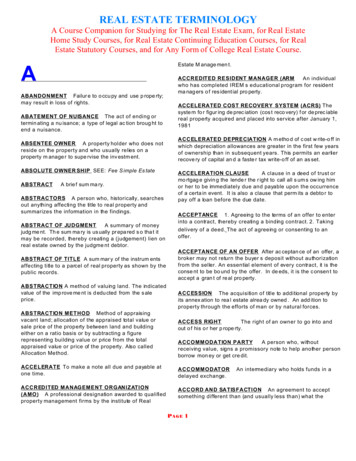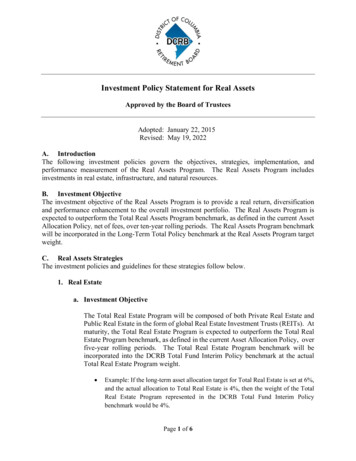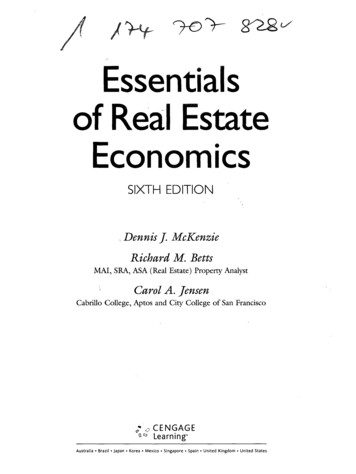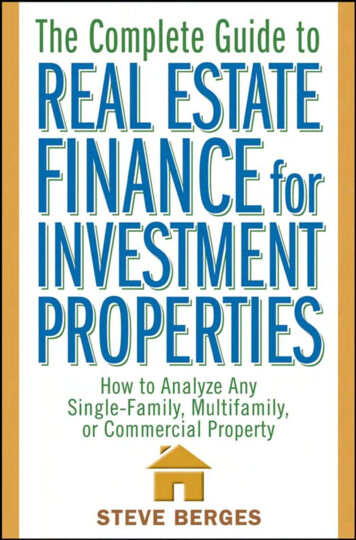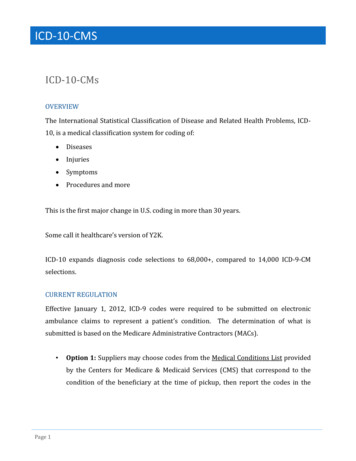
Transcription
1The Real Estate BusinessReal Estate ProfessionsReal Estate BrokerageProfessional OrganizationsRegulation and LicensingREAL ESTATE PROFESSIONSReal estate activitiesProfessional specialtiesProperty type specializationIn its broadest sense, the real estate industry is the largest single industry in theAmerican economy. Within it one might include the construction industry, itselfoften considered our country's largest business. In addition, the real estateindustry may be said to include the creation, management, and demolition ofevery residence and business facility in the nation: offices, warehouses, factories,stores, and special purpose buildings such as hospitals and government facilities.The real estate business would include as well the managing of all theundeveloped land in the country: national parks, forests, and the vast quantity ofunused federal property.Real estate professionals are individuals and business organizations whose soleenterprise is performing a real estate-related service or function. A wide rangeof professions is available to persons wishing to enter the real estate business.Real estateactivitiesReal estate professionals perform the following property-related functions: creation and improvementmanagement and maintenancedemolitioninvestment ownershipregulationtransferCreation and improvement. Creating real properties from raw land involvescapital formation, financing, construction contracting, and regulatory approvals.The key parties involved in this aspect of the business are generally thedeveloper, the landowner, and the mortgage lender. Also involved are marketanalysts, architects, engineers, space planners, interior designers, andconstruction subcontractors.Chapter 1: The Real Estate Business 7
Experts who manage the legal aspects of the development project include realestate attorneys, title companies, surveyors, property insurance companies, andgovernment regulatory officials. The brokerage community, with the assistanceof professional appraisers, usually handles the ownership and leasingtransactions that occur over the many phases of development.Management and maintenance. All real estate, whether raw land or improvedproperty, must be managed and maintained. The two principal types ofmanagers are property managers and asset managers. Property managers andtheir staff oversee specific properties on behalf of the owners, making sure thecondition of the property and its financial performance meet specific standards.Asset managers oversee groups of properties, or portfolios. Their role is toachieve the investment objectives of the owners as opposed to managing dayto-day operations.Maintenance personnel include engineers, systems technicians, janitorial staff,and other employees needed to maintain the property's condition.Demolition. Demolition experts in conjunction with excavation and debrisremoval experts serve to remove properties that are no longer economicallyviable from the market.Investment ownership. A specialized niche in the real estate business is thereal estate investor who risks capital in order to buy, hold, and sell realproperties. In contrast to property owners whose primary interest is in someother business, the real estate investor focuses on identifying and exploiting realestate investment opportunities for profit. The real estate investor providescapital and liquidity to the real estate market.Regulation. All real estate is to some degree regulated by government. Theprincipal areas of regulation are usage, taxation, and housing administration.Professional regulatory functions include public planners, zoningadministrators, building inspectors, assessors, and administrators of specificfederal statutes such as Federal Fair Housing Laws.Transfer. Rights and interests in real estate can be bought, sold, assigned,leased, exchanged, inherited, or otherwise transferred from one owner toanother. Real estate brokers and the brokers' salespeople are generally centrallyinvolved in such transfers. Other professional participants are mortgage brokers,mortgage bankers, appraisers, insurers, and title companies.8 Principles of Real Estate Practice
ProfessionalspecialtiesIn summary, the six primary functional areas are populated by professionals withthe following specialties.Exhibit 1.1 Professions in Real EstateCreatingManaging &MaintainingProperty typespecializationdeveloperspublic and private plannersarchitectsbuilding contractorsspace plannersmortgage lenders and bankerstitle and escrow companiesinsurersreal estate brokers and agentsmarket analystssurveyorsengineerspublic and private inspectorsmortgage brokerssecurities companiesattorneysappraisersproperty managersmaintenance engineerstechnicians corporate managersasset managersmaintenanceDestroyingdemolition contractorsexcavatorsHoldinginvestorscorporate managersRegulatingassessorszoning administratorspublic plannersbuilding inspectorsTransferringbrokers and agentslenders and bankerstitle and escrow companiesinsurersappraisersmortgage brokersattorneyssurveyorsIn addition to specializing by function, many professionals also specialize in thetype of property they work with. According to the purpose of ownership,properties are classified as residential, commercial, or investment properties.Residential property refers to property that is owned and used for habitation.Such properties may be further classified in terms of how many families they aredesigned to house, whether they are attached to other units or detached, and soforth.Commercial property generally refers to retail and office properties, but mayalso include industrial real estate. The term "commercial" relates to the fact thatthe property can potentially generate income from a business's usage.Investment property refers to any property that is held by its owners forinvestment purposes. All classifications of property may be investmentproperties. Generally, however, the term does not refer to owner-occupiedresidences, even though such properties constitute an investment. Apartments,condominiums, cooperatives, and single-family homes may be considered asinvestment property if non-occupants own the property for investment purposes.These properties are also referred to as residential income properties.Chapter 1: The Real Estate Business 9
According to use, the following classifications of real properties arecommonly accepted.Exhibit 1.2 Classifications of Real Estate by Useresidentialresidential incomeofficeretailindustrialfarm and ranchspecial purposelandThese categories are not absolute, since properties often have overlapping uses.A bank, for example, may have retail as well as office operations. An industrialdistribution facility may include extensive office space. A retail center maycontain offices.Special purpose properties include publicly or privately ownedrecreational facilities, government buildings, churches and schools, andso on.REAL ESTATE BROKERAGEForms of specializationSkills and knowledgeMost newly licensed practitioners choose to begin their real estate careersin residential brokerage.Primary real estate brokerage activities involve performance of one or more ofthe following tasks: locating a buyer for a sellerlocating a seller for a buyerlocating a tenant for a landlordlocating a landlord for a tenantA seller, buyer, landlord or tenant hires a broker to procure the opposite party tothe sale or lease transaction. To help get the job done, the broker hires licensedagents as assistants. The brokerage company, in its simplest form, consists of abroker and the broker's agents, who together work to locate buyers, sellers,tenants and landlords for the broker's clients.10 Principles of Real Estate Practice
Forms ofspecializationIn the modern brokerage environment, brokers and agents specialize along thefollowing lines: property typegeographical areatype of transactiontype of clienttype of relationshipOne's choice of specialization is influenced by competitive factors in the marketand by perceived opportunities.Property type. Since different properties have different features and potentialbuyers, brokers commonly choose to specialize in a property type. Thus thereare: residential agentscommercial agents (office, retail)industrial agentsland agentsGeographical area. Brokers and agents must maintain current, accurate dataon properties. It is not possible to keep track of every property in largermarkets. Therefore, one must create an area of geographical specialization.One's area may be defined by natural barriers; by streets and highways; or by acertain set of subdivisions.Type of transaction. The principal types of transaction are sales, leasesand subleases, exchanges, and options.Each form of transaction involves particular legal documents and considerations.As a result, many agents, particularly commercial agents, specialize in a type oftransaction. For example, in an urban commercial property market, agentsgenerally specialize in either leases or sales.Type of client. Brokers increasingly represent buyers and tenants as well assellers and landlords. Since conflicts of interest may be involved, many brokersrestrict their business to representing either buyers and tenants or sellers andlandlords exclusively.Some brokers and agents also specialize according to the type of businesstheir clients are in or their motivations for the transaction. Thus one findsbrokers who focus exclusively on hospitals, or fast food chains, or executiverelocations.Type of relationship. In recent years, many brokers have specialized inproviding advisory services to clients instead of the traditional transaction-based,commission-compensated services. In the advisory relationship, the broker workson identified real estate tasks or projects in exchange for a fee, salary, or retainer.The fee advisor may or may not focus on completing a transaction.Chapter 1: The Real Estate Business 11
Some of the individual brokerage services that one might perform for a pre-setfee are: Skills andknowledgecomparative price analysisdatabase searchprospect screeningsite analysisProfessionals in the brokerage business must have a broad range of real estateknowledge and skills. Agents must develop a thorough awareness of their localmarket and the properties within it. In addition, agents must develop aproficiency with the economics of real estate: prices, financing, closing costs, andso forth. Equally important are "people" skills: communicating with clients andresponding to their needs.Exhibit 1.3 Skills and Knowledge in Real Estate BrokerageKnowledgelocal market conditionslocal propertiesreal estate principlesreal estate lawvalue estimationreal estate financinginvestment principleslicense lawsrelated math calculationsclosing proceduresS ki l l sfinancial qualificationmarket analysismarketing practicesethical practicesliability managementdata managementsellingtime managementcommunicationwritingbasic computer operationPROFESSIONAL ORGANIZATIONSThere are trade organizations within the real estate industry that support andpromote virtually every form of business specialization. Benefits of membershipinclude training programs, professional designations, and communicationchannels for keeping abreast of events and laws. Trade organization membershipalso generally enhances one's business image in the eyes of clients and thepublic at large.Some of the major trade organizations, institutes and relatedprofessional designations are listed below.12 Principles of Real Estate Practice
Exhibit 1.4 Real Estate Trade Organizations and DesignationsAmerican Society of Appraiserswww.appraisers.orgNational Association of Home Builderswww.nahb.orgAmerican Society of Home Inspectorswww.ashi.comNAIOP Commercial Real Estate DevelopmentAssociationwww.naiop.orgBuilding Owners and Managers Associationwww.boma.orgCCIM Institutewww.ccim.comCertified Commercial-Investment Member (CCIM)Corenet Globalwww.corenetglobal.orgMaster of Corporate Real Estate (MCR)Counselors of Real Estatewww.cre.orgCounselor of Real Estate (CRE)Institute of Real Estate Managementwww.irem.orgCertified Property Manager (CPM)International Association of Assessing Officerswww.iaao.orgInternational Council of Shopping Centerswww.icsc.orgMortgage Bankers Association of Americawww.mbaa.orgCertified Mortgage Banker (CMB)National Association of Real Estate Brokerswww.nareb.comNational Association of Realtorswww.nar.realtorGraduate, Realtors Institute (GRI)Certified International Property Specialist(CIPS)Real Estate Educators Associationwww.reea.orgRealtors Land Institutewww.rliland.comAccredited Land Consultant (ALC)Society of Industrial and Office Realtorswww.sior.comThe Appraisal Institutewww.appraisalinstitute.orgMember, Appraisal Institute (MAI)Senior Residential Appraiser (SRA)Women's Council of Realtorswww.wcr.orgPerformance Management Network (PMN)National Association of Exclusive Buyer’s Agentswww.naeba.orgChapter 1: The Real Estate Business 13
REGULATION AND LICENSINGRegulation of business practicesReal estate license lawsRegulation ofbusiness practicesThe real estate industry is regulated by every level of government. Federal andstate statutes, as well as a large body of court decisions, generally referred to ascommon law, circumscribe how real estate can be developed, managed, andtransferred.Among the laws most relevant to agents and brokers are those relating to: agencycontractsdisclosureenvironmental impactfair housingIn addition to federal, state, and local laws and regulations, the real estateindustry is, to a degree, self-regulated by the codes of ethical conductpropounded by the industry's many trade organizations. For example, theNational Association of Realtors Code of Ethics not only reflects the law butsets an even higher standard of performance for member brokers and agents.It is imperative for new practitioners to understand and abide by the many lawswhich regulate the industry.Real estatelicense lawsState real estate license laws comprise the primary body of laws and regulationsgoverning real estate brokerage practice. License laws in each state specify whomust obtain a license to practice real estate and set the requirements forobtaining and maintaining the license. License laws also define critical aspectsof real estate brokerage, including procedures for handling escrow deposits and feesprocedures for advertisingguidelines for dealing with clients and customersState license laws are administered in each state by a real estate commission.The commission is charged with administering and enforcing license laws. Inaddition, the commission may pass regulations that further refine or clarify statestatutes.14 Principles of Real Estate Practice
1REAL ESTATEPROFESSIONSThe Real Estate BusinessSnapshot Review1Real estate activities create, improve, manage, maintain, demolish, own, regulate, and transfer realpropertiesProperty typespecializations residential; residential income; office; retail; industrial; farm and ranch; specialpurpose; landREAL ESTATEBROKERAGE procure a buyer or tenant for an owner or landlord, or vice versaForms of specialization by property type; geographical area; type of transaction; type of client; by form ofbusiness organization; or by form of client relationshipSkills and knowledge market conditions; law; financing; marketing; ethics; selling; communications;computer basics; and other skillsPROFESSIONALORGANIZATIONS promote interests of practitioners and enhance their professional standing all facets of the industry are regulated by federal, state, and local laws; agentsmust understand relevant laws and adapt business practices accordinglyReal estate license laws the primary body of laws and regulations governing the licensure and conductof real estate brokers and agentsREGULATIONAND LICENSINGRegulation ofbusiness practices license laws are administered and enforced under the jurisdiction of the statereal estate commissionChapter 1: The Real Estate Business 15
Real estate professionals are individuals and business organizations whose sole enterprise is performing a real estate-related service or function. A wide range of professions is available to persons wishing to enter the real estate business. Real estate activities Real estate professionals perform the following property-related functions:


